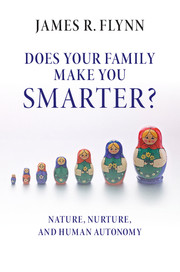Book contents
- Frontmatter
- Dedication
- Epigraph
- Contents
- List of figures, tables and boxes
- Acknowledgments
- Part I Human autonomy
- 1 Twins and autonomy
- 2 Justice and freedom
- 3 The great debate
- 4 Slow and quick decay of family effects
- 5 Reconciliation with twins and adoptions
- 6 The fairness factor
- Part II Intelligence
- For scholars who wish to use the Age-Table Method to measure family effects in nations other than the USA
- Appendix I Wechsler Vocabulary and description of method of analysis
- Appendix II Stanford-Binet Vocabulary
- Appendix III Raven's Progressive Matrices
- References
- Name index
- Subject index
4 - Slow and quick decay of family effects
from Part I - Human autonomy
Published online by Cambridge University Press: 05 June 2016
- Frontmatter
- Dedication
- Epigraph
- Contents
- List of figures, tables and boxes
- Acknowledgments
- Part I Human autonomy
- 1 Twins and autonomy
- 2 Justice and freedom
- 3 The great debate
- 4 Slow and quick decay of family effects
- 5 Reconciliation with twins and adoptions
- 6 The fairness factor
- Part II Intelligence
- For scholars who wish to use the Age-Table Method to measure family effects in nations other than the USA
- Appendix I Wechsler Vocabulary and description of method of analysis
- Appendix II Stanford-Binet Vocabulary
- Appendix III Raven's Progressive Matrices
- References
- Name index
- Subject index
Summary
Questions
(1) What cognitive abilities show the most persistent family effects and what cognitive abilities show the least?
(2) What seems to determine either persistence or lack of persistence?
I will anticipate the answers to our questions. The family has its most persistent effects on those cognitive abilities that children experience their parents using in everyday life: when they hear the language their parents use (Vocabulary and Similarities); when they hear the facts about the world their parents talk about (Information); when they observe their parent speaking and acting to cope with life (Understanding). Family effects are less persistent for those cognitive abilities that are “test-specific,” abilities that are performed primarily in the test room. For example, Block Design and Object Assembly are rather like three-dimensional jigsaw puzzles; Picture Completion is spotting something missing in a picture (such as the hands of a clock).
Table 7a averages our total data (from 1950.5 to 2004.5) to contrast the persistence of family effects on Vocabulary (the most lasting effects) with Block Design and Picture Completion (among the subtests for which family effects fade quickly). At age 7, Vocabulary shows that family environment levies huge disadvantages/advantages, ranging from 6.92 IQ points to 20.75 IQ points. Much diminished, these effects persist to age 17 and even up to age 24. Wechsler Vocabulary shows seven significant effects (more than 2 IQ points) at mature ages. Stanford-Binet Vocabulary is really the same in that no estimates are possible above age 17. On the other hand, the test-specific subtests show family effects of only 1.03 to 10.61 IQ points at age 7, and these have largely disappeared by age 14.5.
In this table and subsequent tables, certain values appear in italics. These values are contrary in sign – that is, you get some minus values rather than plus values above the median, and plus rather than minus values below. They may be measurement error. They are rare, usually quite small, and occur only at older ages.
I have now redeemed the first promissory note mentioned in Chapter 2. There I gave an estimate of the family disadvantages and advantages at various performance levels (as a prelude to coping with the SAT).
- Type
- Chapter
- Information
- Does your Family Make You Smarter?Nature, Nurture, and Human Autonomy, pp. 42 - 61Publisher: Cambridge University PressPrint publication year: 2016



